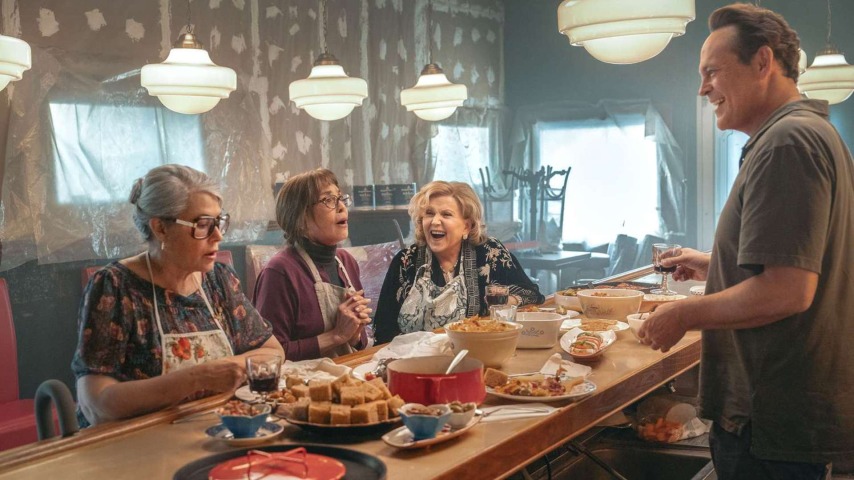Nonnas deserves more time to stir the sauce
An ensemble of excellent women booze and cajole their way through the gooey, restaurant-themed film. But let them cook!
Photo: Netflix
In director Stephen Chbosky and screenwriter Liz Maccie’s straightforward, seemingly apolitical, cheese-heavy fare Nonnas, there is allegedly nothing that a good meal can’t fix. Based on the story behind the real Staten Island restaurant Enoteca Maria, famous for employing nonnas from all over the world, the film follows Jody “Joe” Scaravella (Vince Vaughn) as he emotionally blackmails his way into owning and running a homestyle Italian restaurant as a tribute to his dearly beloved mother. Of course, Joe doesn’t see it that way, and neither does Nonnas, but Vaughn’s constant upwards failure becomes increasingly grating when it takes away screentime from the real stars of the show: the grandmothers, the gravy, and the Catholic guilt.
Nonnas opens with a deep hit of nostalgia that will be its throughline. The setting is Brooklyn, 40 years ago, where young Joe (Theodore Helm) scampers through an Italian bakery with the rest of the neighborhood early risers. He and director of photography Florian Ballhaus marvel at the rows of sumptuous pastries, breads, and sparkling confections that beckon from display cases. The treats look so damn good (albeit, tinted with that telltale nostalgic sepia) that Joe can’t wait until he gets home to devour them. In his family’s busy brownstone, bursting with friends, neighbors, and family, he is only lightly chided for the indiscrete powdered sugar on his chin before his saintly mother Maria (Kate Eastman) and loving Nonna (Karen Giordano) invite him into that most precious process of preparing the Sunday sauce. Grandmotherly pearls of wisdom about cooking from the heart are doled out, tantalizing plates are piled high, and Joe sits on the couch, gazing at the scene in wide-eyed awe. Life is good.
Cut to: death. On the same couch in the same brownstone, 40 years later, Joe’s moroseness at his mother’s passing is treated the only way it can be—as the sign of an empty stomach. Friends and neighbors, including couple Bruno (a hammy Joe Manganiello) and Stella (Drea de Matteo playing a more fortunate version of her Sopranos character), once again crowd the home with food and love and care for MTA worker and certifiable good guy Joe. At a home-cooked dinner shortly after, Stella and Bruno encourage Joe to use his mother’s life insurance money to do something meaningful for himself, now that he’s no longer his mother’s primary caretaker. They mean invest in a hobby or freshen up the house—perhaps even invite in the possibility of a girlfriend. However, Joe, reeling from loss and newly rediscovering his love of recreating the dishes of his ten-minute childhood montage, uses nearly all of the money to buy a decrepit restaurant in Staten Island, and hatches a harebrained scheme to employ real nonnas, not trained chefs, in the kitchen.
It’s not easy to become invested in Joe, whose most apparent emotional quality is his love for his perfectly dimensionless mother and childhood memories. He stumbles through life and the construction of a restaurant, which irks Bruno to no end. Vaughn’s puckish “whaddya gonna do” smiles, mumbled jokes, and constant calling in of favors as he trips over building code violations, workplace absences, financial mismanagement, and neighborhood faux pas (not respecting the restaurant’s former owners, for instance) smooth over light trouble, and no logistical fallacy can outweigh the indomitable power of being a mama’s boy.
 Keep scrolling for more great stories.
Keep scrolling for more great stories.
